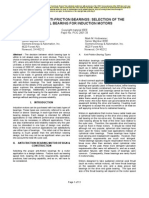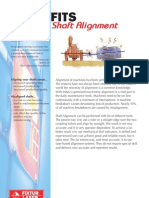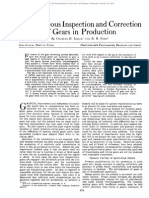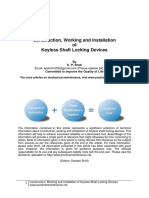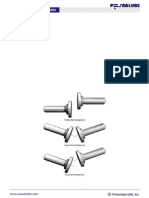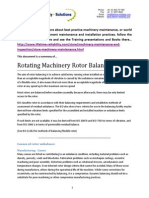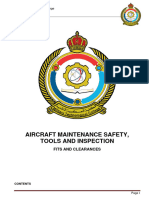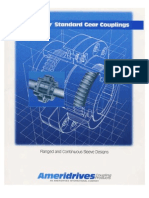0 ratings0% found this document useful (0 votes)
26 viewsShaft Alignment Is A Profitable Form of Preventative Maintenance
Shaft Alignment Is A Profitable Form of Preventative Maintenance
Uploaded by
belenyeriruelAbout 50% of all breakdowns in rotating machinery is caused by poor alignment. SKF shaft aligning systems are efficient, reliable and user-friendly. A 20% load increase from misalignment reduces the bearing life by 50%.
Copyright:
© All Rights Reserved
Available Formats
Download as PDF, TXT or read online from Scribd
Shaft Alignment Is A Profitable Form of Preventative Maintenance
Shaft Alignment Is A Profitable Form of Preventative Maintenance
Uploaded by
belenyeriruel0 ratings0% found this document useful (0 votes)
26 views1 pageAbout 50% of all breakdowns in rotating machinery is caused by poor alignment. SKF shaft aligning systems are efficient, reliable and user-friendly. A 20% load increase from misalignment reduces the bearing life by 50%.
Original Title
formulas15.pdf
Copyright
© © All Rights Reserved
Available Formats
PDF, TXT or read online from Scribd
Share this document
Did you find this document useful?
Is this content inappropriate?
About 50% of all breakdowns in rotating machinery is caused by poor alignment. SKF shaft aligning systems are efficient, reliable and user-friendly. A 20% load increase from misalignment reduces the bearing life by 50%.
Copyright:
© All Rights Reserved
Available Formats
Download as PDF, TXT or read online from Scribd
Download as pdf or txt
0 ratings0% found this document useful (0 votes)
26 views1 pageShaft Alignment Is A Profitable Form of Preventative Maintenance
Shaft Alignment Is A Profitable Form of Preventative Maintenance
Uploaded by
belenyeriruelAbout 50% of all breakdowns in rotating machinery is caused by poor alignment. SKF shaft aligning systems are efficient, reliable and user-friendly. A 20% load increase from misalignment reduces the bearing life by 50%.
Copyright:
© All Rights Reserved
Available Formats
Download as PDF, TXT or read online from Scribd
Download as pdf or txt
You are on page 1of 1
Keeping in mind that about 50% of all breakdowns in rotating
machinery is caused by poor alignment, the need for accurate shaft
alignment is obvious. Proper
alignment will increase
production and lower
maintenance costs.
SKF shaft aligning
systems are efficient,
reliable and user-friendly.
This illustration shows the
SKF laser shaft alignment
system which is most suitable to be used for all the various
aligning operations needed.
37 T H E B C B C O M M U N I C A T O R
Alignment of Shafts
Another type of misalignment is shaft misalignment.
Misaligned shafts will often cause problems with the
components in the machinery. Investigations made in the
USA have shown that misalignment can be traced as the
cause of about 50% of the breakdown in rotating machinery.
Organized and implemented alignment of the shafts therefore
is a protable form of preventative maintenance.
Two Basic Types of Shaft Misalignment
The basic types of misalignments are parallel (offset) and
angular. In practice these always occur in combination.
The objective with shaft alignment is to adjust two units
of rotating machinery so that the shafts of the units are
in a straight line.
Shaft Misalignment and Bearing Life
The function and reliability of a machine depends to a
large degree on how well its shafts are aligned.
Misaligned shafts generate a moment that creates a
reaction force in the bearings of the drive and driven units.
A 20% load increase from misalignment reduces the
calculated bearing life by 50%. Another serious effect is the
wear on seals, which will increase the risk of additional
damage to the bearing by intrusion of contamination or
leakage of the lubricant.
It is easy to understand that the implementation of a well-
organized alignment program for critical machines will save
cost and trouble. The service life of both bearings and seals
will also improve. Other spin-offs are less vibration, noise
and energy consumption.
Checking for Soft Foot and Unparallelity
Soft foot is the expression used when a machine is not
resting equally on all feet. Using a dial indicator applied to
the top of the foot, loosen the bolt and read the movement
on the indicator. A rule of thumb is that if the reading
exceeds 0,05 mm it is necessary to make an adjustment by
shimming or machining.
A more serious situation is when the feet are not parallel
with the base plate. Check the base so it is straight, as many
examples of damage have been attributed to ageing
concrete. Other causes, which will affect the alignment, are
rust, paint, burns and thermal changes. Also check if the
bolts are well centred in the holes, to allow horizontal
movement of the unit when aligning. Another tip to make sure
that everything is in alignment is to examine the distance
between the coupling halves and to make sure that they are
those that were recommended by the manufacturer.
Misaligned shafts may cause:
increased bearing load
reduction of bearing life
increased wear of seals
increased vibrations
increased noise, and
increased energy
consumption
which will be avoided by proper
shaft alignment.
The SKF laser
alignment
system.
Laser beams.
Stationary machine.
Adjust until the display
shows 0 (zero) for both
x- and y-axis.
Trouble-free operation requires proper alignment of
rotating machinery:
Shaft Alignment is a
Protable Form of
Preventative Maintenance
This article was provided by SKF and contained within the
SKF Bearing Maintenance Handbook, available from your local
BC Bearing ofce.
You might also like
- Small Block Chevrolet: Stock and High-Performance RebuildsFrom EverandSmall Block Chevrolet: Stock and High-Performance RebuildsRating: 4 out of 5 stars4/5 (14)
- Hercus TextBook of TurningDocument56 pagesHercus TextBook of TurningFrancois Marais100% (2)
- GM Automatic Overdrive Transmission Builder's and Swapper's GuideFrom EverandGM Automatic Overdrive Transmission Builder's and Swapper's GuideRating: 4.5 out of 5 stars4.5/5 (8)
- Levelling and ALIGNINGDocument7 pagesLevelling and ALIGNINGThe Gamers ZoneNo ratings yet
- Automotive Machining: A Guide to Boring, Decking, Honing & MoreFrom EverandAutomotive Machining: A Guide to Boring, Decking, Honing & MoreRating: 4.5 out of 5 stars4.5/5 (11)
- Modern Engine Blueprinting Techniques: A Practical Guide to Precision Engine BlueprintingFrom EverandModern Engine Blueprinting Techniques: A Practical Guide to Precision Engine BlueprintingRating: 4 out of 5 stars4/5 (10)
- Chevy Differentials: How to Rebuild the 10- and 12-BoltFrom EverandChevy Differentials: How to Rebuild the 10- and 12-BoltRating: 5 out of 5 stars5/5 (17)
- Grundfos Alignment-White PaperDocument21 pagesGrundfos Alignment-White PaperDelfinshNo ratings yet
- Sleeve Vs Antifriction Bearings Selection of The Optimal BearingDocument13 pagesSleeve Vs Antifriction Bearings Selection of The Optimal BearingKamal Arab50% (2)
- Performance Exhaust Systems: How to Design, Fabricate, and Install: How to Design, Fabricate, and InstallFrom EverandPerformance Exhaust Systems: How to Design, Fabricate, and Install: How to Design, Fabricate, and InstallRating: 4 out of 5 stars4/5 (8)
- Swap LS Engines into Chevelles & GM A-Bodies: 1964-1972From EverandSwap LS Engines into Chevelles & GM A-Bodies: 1964-1972Rating: 4.5 out of 5 stars4.5/5 (3)
- Laser Shaft Alignment: Report No:1Document36 pagesLaser Shaft Alignment: Report No:1Mahmoud Morsy AboualiNo ratings yet
- Alignment Basics - Part OneDocument2 pagesAlignment Basics - Part Oneamigoeres7337No ratings yet
- Machine Installation - Shaft AlignmentDocument17 pagesMachine Installation - Shaft AlignmentD.b. Tampubolon100% (1)
- 6 Steps To Shaft Alignment PDFDocument18 pages6 Steps To Shaft Alignment PDFAhmed SaifeldinNo ratings yet
- Whitepaper - AlignmentDocument20 pagesWhitepaper - Alignmentmanbkk100% (2)
- Dynamic Movement White Paper: Vibralign, Inc. 530G Southlake BLVD Richmond, Va 232326 804.379.2250Document0 pagesDynamic Movement White Paper: Vibralign, Inc. 530G Southlake BLVD Richmond, Va 232326 804.379.2250SreenivasNo ratings yet
- Benefits Shaft AlignmentDocument4 pagesBenefits Shaft AlignmentCarolina PBNo ratings yet
- Checking Bearing AlignmentDocument4 pagesChecking Bearing AlignmentTheerayootNo ratings yet
- What's The Point of Precision Shaft Alignment When We Use Flexible Couplings?Document1 pageWhat's The Point of Precision Shaft Alignment When We Use Flexible Couplings?faizan abbasiNo ratings yet
- Onsite Balancing and Analysis: ShaftsDocument3 pagesOnsite Balancing and Analysis: ShaftsAmmarNo ratings yet
- Management Guide To AlignmentDocument3 pagesManagement Guide To Alignmentjonalthan1987No ratings yet
- Simultaneous Inspection and Correction of Gears in ProductionDocument9 pagesSimultaneous Inspection and Correction of Gears in ProductionsamanaveenNo ratings yet
- Shaft Precision Alignment FundamentalsDocument9 pagesShaft Precision Alignment FundamentalsJenny Cecilia Ureña ZuriNo ratings yet
- Seminar ReportDocument22 pagesSeminar Reportअंकुर कांचनNo ratings yet
- Construction, Working and Installation of Keyless Shaft Locking DevicesDocument13 pagesConstruction, Working and Installation of Keyless Shaft Locking DevicesJoshua GrahitaNo ratings yet
- 4 - The Importance of Motor Shaft AlignmentDocument2 pages4 - The Importance of Motor Shaft AlignmentShahzadNasirNo ratings yet
- Bearings And Bearing Metals: A Treatise Dealing with Various Types of Plain Bearings, the Compositions and Properties of Bearing Metals, Methods of Insuring Proper Lubrication, and Important Factors Governing the Design of Plain BearingsFrom EverandBearings And Bearing Metals: A Treatise Dealing with Various Types of Plain Bearings, the Compositions and Properties of Bearing Metals, Methods of Insuring Proper Lubrication, and Important Factors Governing the Design of Plain BearingsRating: 4 out of 5 stars4/5 (1)
- Shaft Alignment White PaperDocument14 pagesShaft Alignment White PaperHamed HamedNo ratings yet
- Gear CouplingsDocument15 pagesGear CouplingsVishweshwar MadhavNo ratings yet
- Ponencia 29Document8 pagesPonencia 29Enrique MorenoNo ratings yet
- Bearing Damage AnalysisDocument12 pagesBearing Damage AnalysisZulfahmi IrhamdaniNo ratings yet
- CM M 03 AlignmentDocument76 pagesCM M 03 AlignmentAjay RanganathanNo ratings yet
- Shaft AlignmentDocument7 pagesShaft AlignmentAmitanshu SharmaNo ratings yet
- Shaft Alignment On PumpsDocument1 pageShaft Alignment On PumpsTuanbk NguyenNo ratings yet
- Axial Clearance in Thrust BearingsDocument8 pagesAxial Clearance in Thrust BearingsSasi NimmakayalaNo ratings yet
- Falk Alignment Free Drive™Document5 pagesFalk Alignment Free Drive™Jose Antonio García RuízNo ratings yet
- 07 VogelDocument10 pages07 VogelAnonymous OFwyjaMyNo ratings yet
- Backlashvs LostMotion PDFDocument4 pagesBacklashvs LostMotion PDFjeyaselvanmNo ratings yet
- Coupling LubricationDocument6 pagesCoupling LubricationmarcalasanNo ratings yet
- Rotating Machinery Rotor BalancingDocument15 pagesRotating Machinery Rotor Balancingprajash007100% (1)
- Chapter 6: Mechanical Equipment Maintenance 6.2 GEARSDocument5 pagesChapter 6: Mechanical Equipment Maintenance 6.2 GEARSChee Onn0% (1)
- Rotary TableDocument12 pagesRotary TableNakul Devaiah50% (2)
- LO 3 Tolerances Fits Clearances and Precision Measuring ToolsDocument26 pagesLO 3 Tolerances Fits Clearances and Precision Measuring Toolsalsinani99.000No ratings yet
- Coupling HandbookDocument82 pagesCoupling Handbookbbmoksh100% (1)
- Why Alignment 8 Page Brochure Ali 9.100!02!10 GDocument8 pagesWhy Alignment 8 Page Brochure Ali 9.100!02!10 GAlejandro Jimenez FuentesNo ratings yet
- Literature Review of BearingDocument5 pagesLiterature Review of Bearingea4c954q100% (1)
- Amerigear CouplingsDocument48 pagesAmerigear Couplingsuak107080No ratings yet
- MAN ShaftErrosion SL2008-498Document18 pagesMAN ShaftErrosion SL2008-498flipflop12100% (1)
- Engine Crankshaft Deflection Measurement Guide - IIMSDocument9 pagesEngine Crankshaft Deflection Measurement Guide - IIMSNyan ThutaNo ratings yet
- Lathe TutorialDocument56 pagesLathe TutorialMichel Rigaud89% (9)
- A DIY'ers Definitive Guide to Building a Custom Volkswagen TrikeFrom EverandA DIY'ers Definitive Guide to Building a Custom Volkswagen TrikeNo ratings yet
- Torqueflite A-727 Transmission Handbook HP1399: How to Rebuild or Modify Chrysler's A-727 Torqueflite for All ApplicationsFrom EverandTorqueflite A-727 Transmission Handbook HP1399: How to Rebuild or Modify Chrysler's A-727 Torqueflite for All ApplicationsNo ratings yet
- A Book of Helpful Tips on Overhauling a Vintage Engine - Including Car, Motorbike and Lawn Mower EnginesFrom EverandA Book of Helpful Tips on Overhauling a Vintage Engine - Including Car, Motorbike and Lawn Mower EnginesRating: 5 out of 5 stars5/5 (1)
- LS Gen IV Engines 2005 - Present: How to Build Max PerformanceFrom EverandLS Gen IV Engines 2005 - Present: How to Build Max PerformanceRating: 5 out of 5 stars5/5 (2)
- Why Industrial Bearings Fail: Analysis, Maintenance, and PreventionFrom EverandWhy Industrial Bearings Fail: Analysis, Maintenance, and PreventionNo ratings yet
- Mock Aba QuestionsDocument2 pagesMock Aba QuestionsKM KerriNo ratings yet
- Temi 9 1727299Document4 pagesTemi 9 1727299Dennys Samillan OrtizNo ratings yet
- Abbe Mat 200Document2 pagesAbbe Mat 200Syed RizviNo ratings yet
- Education of Sita-Pt1Document14 pagesEducation of Sita-Pt1ypyee100% (4)
- Hilly's Pumpkin Caramel Pie Recipe Milk BarDocument1 pageHilly's Pumpkin Caramel Pie Recipe Milk Barnoah.kanner31No ratings yet
- CSI 19SPI BrochureDocument1 pageCSI 19SPI Brochurejjuliann1No ratings yet
- PHIL286 Handout 8Document3 pagesPHIL286 Handout 8Mochammad AndreNo ratings yet
- En5815 2 0 03 18 - PWTDocument4 pagesEn5815 2 0 03 18 - PWTs wNo ratings yet
- Examples of Critical Thinking EssaysDocument6 pagesExamples of Critical Thinking Essaysafibaubdfmaebo100% (2)
- Solarasia Catalog (2024-03-10 06 - 43 - 27)Document26 pagesSolarasia Catalog (2024-03-10 06 - 43 - 27)Cesar Parisuaña AlvaroNo ratings yet
- Company Description: The Associated Cement Companies LimitedDocument5 pagesCompany Description: The Associated Cement Companies LimitedmanishaNo ratings yet
- Definition, Assessment, and Staging of Treatment-Resistant Refractory Major DepressionDocument9 pagesDefinition, Assessment, and Staging of Treatment-Resistant Refractory Major DepressionPetru-Emanuel DascalitaNo ratings yet
- World Pipe 2003Document4 pagesWorld Pipe 2003MostafaRockNo ratings yet
- Labrel CasesDocument5 pagesLabrel CasesJoy Orena0% (1)
- CropKing Business ExplainedDocument8 pagesCropKing Business Explainedn3m6No ratings yet
- Feedback Maureen 2022Document2 pagesFeedback Maureen 2022MajorNo ratings yet
- Language Abilities in Bilingual Children With Autism PDFDocument213 pagesLanguage Abilities in Bilingual Children With Autism PDFSil TeixeiraNo ratings yet
- KAS Sample Paper 3 Vol 3.Document19 pagesKAS Sample Paper 3 Vol 3.Sneha M VincentNo ratings yet
- BSC Culinary 4th Sem Garde Manger NotesDocument34 pagesBSC Culinary 4th Sem Garde Manger Noteskr.gokul9940No ratings yet
- Hulda Clark - ZapperDocument12 pagesHulda Clark - ZapperlymofNo ratings yet
- TLE - ICT Script 9-25-2020Document9 pagesTLE - ICT Script 9-25-2020Jake Role GusiNo ratings yet
- Internal Training Traning Conducted By: B.A Mohamed Ibrahim Topic: Safety in LiftingDocument4 pagesInternal Training Traning Conducted By: B.A Mohamed Ibrahim Topic: Safety in LiftingibrahimNo ratings yet
- English For HotelDocument2 pagesEnglish For Hotelrosita and himNo ratings yet
- Intermolecular ForcesDocument109 pagesIntermolecular Forcespearl creedNo ratings yet
- Midterm-Exam-Test-Paper ALONDRADocument6 pagesMidterm-Exam-Test-Paper ALONDRAMae CherryNo ratings yet
- BUY 2.5 BHK: in This Case You ShouldDocument1 pageBUY 2.5 BHK: in This Case You ShouldSudhir ChitlaNo ratings yet
- Marketing of Ecofriendly and Low Cost Sanitary Napkins A Literature Review December 2021 0046515237 7608843Document4 pagesMarketing of Ecofriendly and Low Cost Sanitary Napkins A Literature Review December 2021 0046515237 7608843Samridhi SinghalNo ratings yet
- Chapter # 21 Xii FDC: Prepared By: Sidra JavedDocument42 pagesChapter # 21 Xii FDC: Prepared By: Sidra JavedHà Anh Minh LêNo ratings yet
- School WaiverDocument3 pagesSchool WaiverMarlon SolanoNo ratings yet
- PVC LINK Catalogue 2014Document16 pagesPVC LINK Catalogue 2014Siew Choo SoonNo ratings yet









